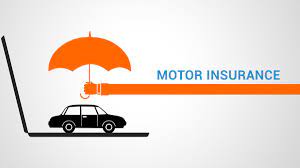Motor insurance is a critical aspect of owning and operating a vehicle, providing financial security and legal compliance. In this detailed guide, we’ll cover the types of motor insurance, their benefits, coverage, claim process, and tips to choose the best policy.
What is Motor Insurance?
Motor insurance is a contract between the policyholder and an insurance company that offers financial protection against losses arising from accidents, theft, or damage to the insured vehicle. It also covers liabilities for injuries or damages caused to third parties.

Types of Motor Insurance Policies
- Third-Party Liability Insurance:
- Mandatory Coverage: Covers damages to third-party property, injuries, or death caused by the insured vehicle.
- No coverage for own vehicle: It doesn’t include protection for your car or personal injuries.
- Comprehensive Motor Insurance:
- Extensive Coverage: Includes both third-party liabilities and own vehicle damage.
- Covers incidents like theft, vandalism, natural disasters (floods, earthquakes), and man-made events (riots).
- Standalone Own-Damage Insurance:
- Focuses solely on damages to the insured vehicle.
- Often paired with a separate third-party liability policy.
- Usage-Based Insurance (Pay-as-you-drive):
- Premiums are calculated based on usage or mileage, ideal for low-mileage drivers.
Key Features of Motor Insurance
- Premium Amount:
- Determined by factors like the car’s model, age, location, and Insured Declared Value (IDV).
- Insured Declared Value (IDV):
- Represents the current market value of the vehicle.
- The claim amount for theft or total damage is based on IDV.
- Add-On Covers:
- Zero Depreciation Cover: Ensures full claim without considering depreciation.
- Roadside Assistance: Covers emergency services like towing or fuel delivery.
- Engine Protection: Protects against waterlogging or oil leakage damages.
- Return to Invoice: Offers the full invoice value in case of total loss.
- No Claim Bonus (NCB):
- Discount on premium for claim-free years, ranging from 20% to 50%.
Benefits of Motor Insurance
- Legal Compliance:
- Having at least third-party insurance is mandatory under the Motor Vehicles Act in many countries.
- Financial Security:
- Protects against the high costs of repairs, replacements, or third-party damages.
- Coverage for Natural Disasters:
- Comprehensive policies cover damages from floods, earthquakes, storms, and more.
- Personal Accident Cover:
- Provides compensation for the owner-driver in case of injuries or death.
- Peace of Mind:
- Reduces the stress of managing financial liabilities in the event of unforeseen incidents.
How to File a Motor Insurance Claim
- Report the Incident:
- Notify the insurer immediately about the accident, theft, or damage.
- Collect Evidence:
- Take photos of the damage and gather details of the involved parties (if applicable).
- Filing an FIR (if required):
- For major accidents or theft, file a First Information Report with the police.
- Submit Documents:
- Provide the claim form, policy document, RC book, driving license, and bills (if applicable).
- Surveyor Inspection:
- Insurers often send a surveyor to assess the damage and validate the claim.
- Claim Settlement:
- Depending on the policy, you’ll either receive a reimbursement or cashless repair service.
Exclusions in Motor Insurance
Motor insurance policies do not cover:
- Normal wear and tear.
- Damage due to driving under the influence of alcohol or drugs.
- Electrical or mechanical breakdowns (unless covered by add-ons).
- Consequential damages not directly caused by the insured event.
Tips for Choosing the Best Motor Insurance
- Compare Policies Online:
- Use comparison tools to evaluate premiums, coverage, and add-ons.
- Check Claim Settlement Ratio:
- Opt for insurers with high claim approval rates.
- Understand the Coverage:
- Read the terms, conditions, and exclusions in detail.
- Select Relevant Add-Ons:
- Customize your policy based on your driving habits and vehicle type.
- Utilize No Claim Bonus (NCB):
- Retain your NCB benefits by avoiding unnecessary claims.
Importance of Motor Insurance
Motor insurance ensures compliance with legal requirements, provides financial security, and offers peace of mind. With the right policy, you can safeguard yourself, your vehicle, and others on the road.
FAQs About Motor Insurance
Q1. What is the difference between third-party and comprehensive insurance?
- Third-party insurance covers damages to others but not the insured vehicle, whereas comprehensive insurance covers both third-party and own vehicle damages.
Q2. Can I transfer my No Claim Bonus?
- Yes, NCB can be transferred when switching insurers or buying a new vehicle.
Q3. How is motor insurance premium calculated?
- Premium depends on the vehicle’s age, model, IDV, geographical location, and chosen add-ons.
Q4. Is it mandatory to have motor insurance?
- Yes, third-party liability insurance is mandatory under law in most countries.
SEO Tips for Motor Insurance Blogs
- Use keywords like motor insurance, vehicle insurance, types of motor insurance, and car insurance benefits strategically.
- Incorporate FAQs to target voice search queries.
- Optimize meta titles and descriptions with primary and secondary keywords.
- Include internal links to related content like claim processes or insurance add-ons.
- Ensure readability with headers, bullet points, and short paragraphs.
Motor insurance is essential for every vehicle owner, offering legal protection and financial relief during unforeseen circumstances. With this guide, you can better understand its importance, types, and benefits.
